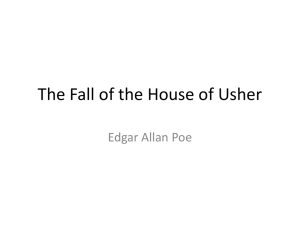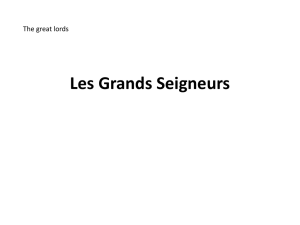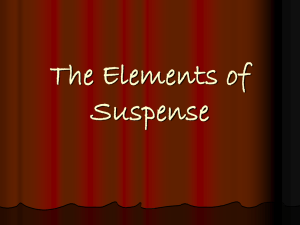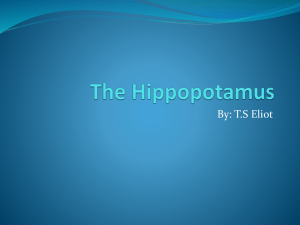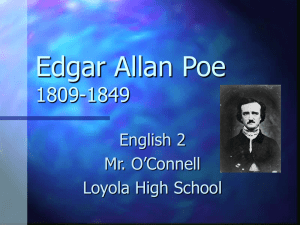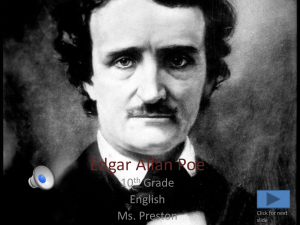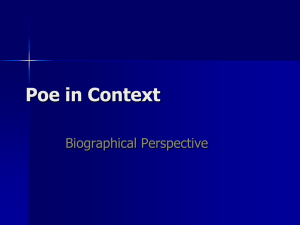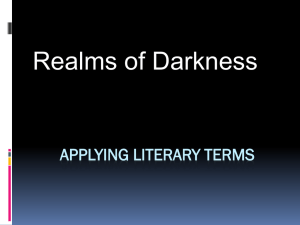Edgar Allan Poe
advertisement
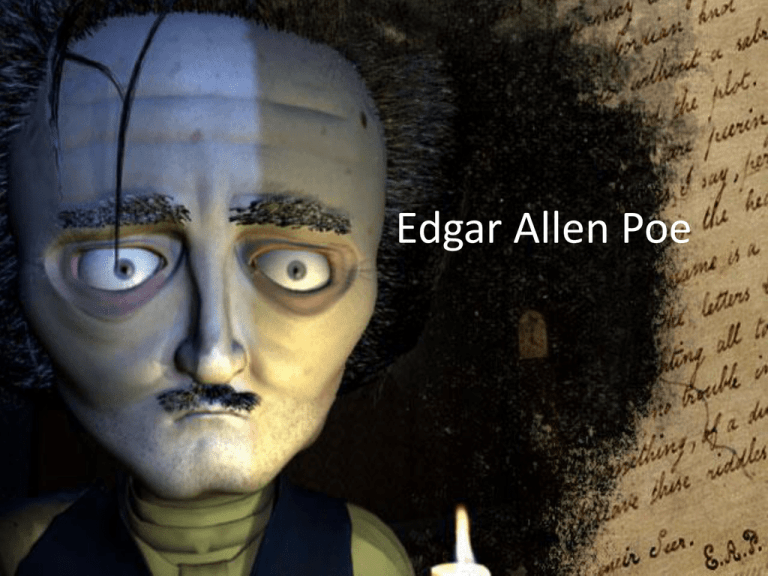
Edgar Allen Poe Overall Goal • Write informative/explanatory texts to examine a topic and convey ideas, concepts, and information through the selection, organization, and analysis of relevant content. KWL What do you know about Edgar Allan Poe? What do you want to know about Edgar Allan Poe? What did you learn about Edgar Allan Poe? Journal Write down anything that you have heard about or know about American author, Edgar Allan Poe. What would you like to learn about him? Day 1 • I will learn various facts about the famous American author Edgar Allan Poe. • I will explain in writing 10 facts about Poe. • Using specific facts from Poe’s life, justify why he chose to write about creepy, sad, and morbid topics. Poe Biography • While watching the film, you will need to write the following information in your journal: – Ten facts that you learn about Poe’s life using the bubble chart. – Write three specific reasons why Poe was inspired to write about creepy, sad, and suspenseful experiences the way that he did. Video Biography • http://www.biograph y.com/video.do?nam e=booography&bcpid =1753162054&bclid= 1859715279&bctid=1 861298412 Simple Sufficient/Sophisticated I think that ________wrote ________ stories because _____________________, ______________________ and__________________. ____________, ___________ and ___________________all provide evidence why ______ wrote _____________ stories. Day 2 • Learning Target: – I will understand the various literary elements that Poe utilizes in his writing. • Language Target: – I will verbally define key literary terms of this unit after taking notes. Vocabulary • Please use the Frayer Model for the next 4 literary terms. Mood • What is ‘mood’? • Mood is the emotional attitude the author takes towards his/her writing piece. • I am in a _________ mood today/right now because ________________. • You can tell I am in a __________ mood today by the way I _______________________________. Share • Read your two sentences to an elbow partner. • For five Hawks: act out your mood in front of the class. First person to guess correctly will also receive 5 Hawks! Foreshadow • Hints within the text that show what might happen next within the story Suspense: Anxiety or apprehension resulting from an uncertain, undecided, or mysterious situation. Personification • Personification is giving human qualities to animals or objects. • Example: The tree’s branches caressed the moon. Create your own example Objects Human Qualities/Actions Tree Screamed Sun Cradled River Kissed Grass Seduced Wind Hugged Fire Whipped Leaves Grabbed Simple Sufficient/Sophisticated _______________________________ means _____________________________________ _____________________________________ I would paraphrase ______________by saying _____________________________________ _____________________________________ An example of _______________________ is _____________________________________ _____________________________________. A synonym for _______________________ is _____________________________________ _____________________________________. Day 3 • Learning Target: – I will understand key words within the story of “The Tell-Tale Heart”. • Language Target: – I will write creative sentences using the key vocab from “The Tell-Tale Heart” and share out with the entire class. The Tell Tale Heart • http://www.archive.org/details/TheTelltaleHeart The Tell-Tale Heart by Edgar Allen Poe Acute (Adjective) Highly sensitive Raptors have acute hearing and vision, which is estimated to be eight to ten times that of humans. The ears of a raptor are an important tool in locating prey. Example Sentence: The teacher’s acute hearing benefitted her when the students whispered their gossip of the day. Vexed (verb) Irritated Example sentence: I vexed my cat when I tried giving her a bath. Sagacity noun Keen perception, with foresight and judgment; wisdom Example sentence: The student’s sagacity shocked the teacher: she thought he was just another mindless teenager hooked on video games and Red Bull. Dissemble (Verb) To hide the truth; pretend Example Sentence: Halloween is the perfect day to dissemble. Stifled (Adjective) smothered Example Sentence: The heat stifled the kitten, making him collapse with exhaustion. Crevice (noun) A crack Example sentence: He slipped through the crevice in the ice, falling to his untimely death Audacity (noun) Shameless daring or boldness Example sentence: She had the audacity to stand up to the angry teacher. Vehemently (Adverb) With intense emotion Example sentence: She vehemently screamed at the dog who used her beautiful front yard as a toilet. Derision (Noun) To Ridicule Example sentence: The derision from the harsh audience made the actor leave the stage in shame. Hypocritical (adjective) False or deceptive, like a person who is pretending to be what he or she is not Example sentence: When the health teacher was caught eating at McDonald’s every day, he was called hypocritical. Story Time • Now write a complete story, using the words we just went over within your sentences. You can change the form of the word (from noun to adjective, singular to plural, etc.) if you so wish. Remember to use imagery, have a definite/clear plot, and flesh out your character(s). It should be AT LEAST a page long. Day 4 • Learning Target: – I will understand how the character changes throughout the story. • Language Target: – I will write a summary paragraph that describes the main character of the story. Literary Analysis Essay • • • • • Topic sentence Concrete detail Commentary Commentary Conclusion sentence Example paragraph for “The Tell Tale Heart” literary analysis • The narrator is obsessed with a frail old man because of his milky white eye. Every night, the narrator sneaks into the old man’s room, shining a thin strip of light from a lantern onto the dreaded eye. He both fears and is angered by the sight. Soon, he will not be able to fight his terrifying fascination. The narrator’s fixation of the old man’s eye is draining him of his sanity. In summary, ________ can be characterized as __________. One concrete detail that shows this is ________________________________. One can see that _______ is ______________. Also, this supports the fact that __________ is _____________________________________. Ultimately, we understand that the _______ is _____________________________________. Prose vs. Film • Analyze the extent to which a filmed or live production of a story or drama stays faithful to or departs from the text or script, evaluating the choices made by the director or actors. Day 5 • Learning Target: – I will understand that there are both similarities and differences between a written version of a story and a filmed version. • Language Target: – I will write down elements that the story and the film both have in common and in contrast (Venn Diagram). Film vs. Story Simple Sufficient Sophisticated Unlike the _____, the _____ is ______________. The _____ is just like the _______ in that they both _____________________. A distinction between the _______ and the ________ is that ________________. Both the _____ and the The _____ is ___________. The _____ is ______; _____ are _____________. In contrast, the _____ is however, the _________ is _____________________. _____________________. The Raven • What do you know about, “The Raven?” • What do we know about Poe’s wife Virginia? • What does the bird, the raven symbolize? The Raven Alliteration • Alliteration is the repetition of initial sounds in neighboring words. • Examples: – sweet smell of success, a dime a dozen, bigger and better Assonance • Assonance is the repetition of vowel sounds in words. • Examples: fleet feet sweep by sleeping geeks Stanza Stanza is a unified group of lines in poetry Ex: A candy bar. A piece of cake. A lollipop. A chocolate shake. A jelly donut. Chocolate chips. Some gummi worms and licorice whips. A candy cane. A lemon drop. Some bubblegum and soda pop. Vanilla wafers. Cherry punch. (My mom slept in while I made lunch.) Symbol • Symbol is using an object or action that means something more than its literal meaning. • Example: ravens are guardians of graveyards and the dead and are symbols of bad omens. First listen, then watch, then analyze! • • http://odeo.com/episodes/23334503-EdgarAllan-Poe-The-Raven-read-by-ChristopherWalken http://dotsub.com/view/58591756-7128-488cbfe9-22463d46d907# • http://www.teachersfirst.com/share/raven/ • In your group you will take your assigned stanzas from, The Raven, and: – Determine what the stanza is saying and retell it in language that a kindergartner would understand. – You will need to look up any unknown words. – Create a “kid friendly” stanza on a piece of computer paper. – Your “kid friendly” creation should be colorful and beautiful because it will become part of our classroom book. – Remember, you are a communicator, your final product should effectively communicate Poe’s ideas and mood. Stanza 1 • What time of night is it? • What is the narrator doing at the beginning of the story? • What does he hear at the door? Kid Friendly Language Stanza 1 One cold, wet evening at midnight I was reading a bunch of old and forgotten books. I was very sleepy and about to nod off when suddenly I heard a sharp knocking on the door! I muttered under my breath that it must be a visitor tapping at my door, just that, and nothing more. Stanza 2 • What time of year does the poem take place? • What is the narrator wishing for? • Who is Lenore? Kid Friendly Language Stanza 2 Oh, I remember now, it was in December when this happened. There was a fire and each of the little embers were jumping out of the fire and dying out on the ground. I was thinking how I wished the day was over. I was reading to forget about my sadness over Lenore. She was so beautiful that the angels named her Lenore, but now she is gone. Stanza 3 • How does the narrator feel at the beginning of this stanza? • What is rustling in the background? • Why is his heart beating so fast? • What does he keep telling himself? Kid Friendly Language Stanza 3 The purple curtain was blowing behind me and I was so scared. My heart was beating so fast! I kept saying to myself that is just a visitor coming to visit me and it is nothing more. I kept saying this to make me feel better because I was so scared. Stanza 4 • What does he say at the beginning of the stanza? • What happens when he opens the door? Kid Friendly Language Stanza 4 • After a while I decided to be brave and I said out loud, “Sir or Madam” I was trying to sleep and your knocking is waking me up! I barely heard you at first but now I do. Then I opened the door…but there was no one there! Stanzas 5 • Why does the narrator continue to stare into the darkness when he hears and sees nothing? • Who whispers Lenore back to him? Kid Friendly Language Stanza 5 • I stood there staring into the darkness, I just kept wondering, and being scared. I think I was thinking thoughts that no one had ever thought before. But then there was a sound in the darkness, and I heard myself whisper, “Lenore?” After I whispered “Lenore,” there was an echo… and I heard her name again. Then there was silence again. Stanzas 6 • How does he rationalize hearing the tapping sound again? • What does he think is making the sound? Kid Friendly Language Stanza 6 • After I closed the door, I felt a fire inside of me. But then I heard that tapping again, it was louder than before! I decided this time that the sound had to be coming from the window. I needed to investigate the sound because I was sure that it was only the wind! Stanzas 7&8 • How does the narrator initially respond to the raven? • What question does he ask the narrator? • How does he describe the raven? Stanzas 9&10 • What has no other human being ever experienced? • What does the narrator mean about his other friends? • What does he think that the Raven will do? Stanzas 11&12 • Why does the author think that the Raven keeps saying, “nevermore?” • Why does the bird still intrigue the author? The Black Cat • I understand how suspense keeps a story exciting and interesting • I will cite textual evidence of suspense within The Black Cat • An example of suspense in The Black Cat is when _____________________________: “find a specific part in the story to copy down the words that support your claim). The Pit and the Pendulum • http://www.youtube.com/watch?v=xmn79SoZ 4-k Literary Analysis Essay • • • • • Topic sentence Concrete detail Commentary Commentary Conclusion sentence Example paragraph for “The Tell Tale Heart” literary analysis • The narrator is obsessed with a frail old man because of his milky white eye. Every night, the narrator sneaks into the old man’s room, shining a thin strip of light from a lantern onto the dreaded eye. He both fears and is angered by the sight. Soon, he will not be able to fight his terrifying fascination. The narrator’s fixation of the old man’s eye is draining him of his sanity. Literary Analysis Outline • Introduction Paragraph – What will you talk about • Three ways that Poe creates suspenseful mood in a story. – First example – Second example – Third example • Describe a time in your own life where you experienced suspense. – Describe the experience with details such as: What happened? Who was there? When did it happen? Where did it happen? Why did it happen? How did you react? • How did the suspense affect Poe’s work and how did your experience affect your own life? – How does the element of suspense affect Poe’s work? (ex: did it make the story more interesting? Did it scare you? Did you like it? Did it make you dislike the story? – How did suspense affect your own life? (Do you like being scared? Does it bother you to feel suspense? – Make a connection between your own experience and Poe’s suspenseful writing. • Conclusion

